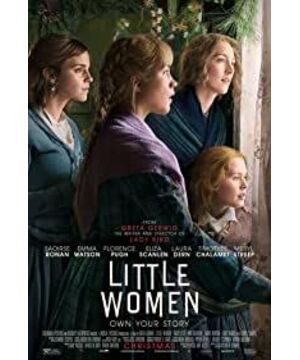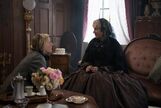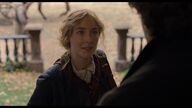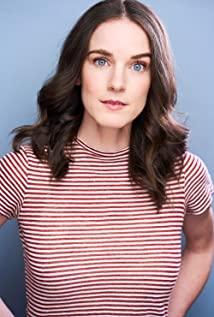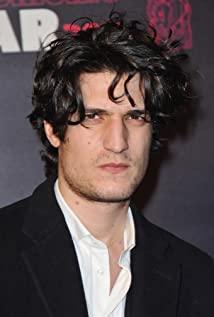1. Qiao's growth and choice Qiao is the most vivid character in the whole film. Although the story takes place in the last century, Qiao's character and ideology have a modern consciousness. The director also uses this role to convey the voice of contemporary women— — In the film, Joe represents contemporary women's choices about their dreams, love and life.
Qiao loves writing. On the one hand, it can bring income to subsidize the family who are living in poverty, and more importantly, it is because of her own love for writing. She likes to let all kinds of novel ideas and brain holes in her mind jump onto the paper and return to peace in her heart. Joe's character is more like a boy, she would rather go crazy with a boy than gossip with a girl, so she is most compatible with labor. On the surface, she doesn't seem to have a delicate mind, but in fact she also has the soft and delicate mind of a girl, and has a kind heart. When she learned that her father was injured, she would take the initiative to sell her long hair for money. Long hair was a requirement for women in that era. When the family saw her short hair, they were shocked and distressed, and admired this girl who devoted herself to contributing to the family. But in the dead of night, this girl who doesn't seem to care about everything will cry because she doesn't have long hair. The director gave Qiao a lot of shots to portray, coupled with Ronan's careful interpretation, her strong sense of belief in the role and mature acting skills make the role of Qiao have vitality and appeal. In the intersecting time and space narrative, the scene of Joe caring for his seriously ill sister occurs twice: Joe, lying beside his sister's bed early in the morning, wakes up to find that his sister is not around, and she runs down the stairs in a panic. In the warm-toned memories of the past, Joe ran downstairs with tears in his eyes and found that his sister was sitting at the dining table eating breakfast. Although her face was haggard, her health had improved. Joe gave a false alarm, hugged Sister Beth happily, and wept happily. In the cold-toned reality, Qiao ran downstairs in panic but only saw her mother. She knew that her beloved sister had left, and the mother and son hugged and cried. Even those who face life optimistically have to face the arrangement of fate. The death of her younger sister was a huge shock to Joe, and it also gave her new thinking about life and life.
The cuteness of Qiao's character lies in her enthusiasm born from the sun, she will run happily and laugh happily, she will be helpless and cry when she encounters problems, proud and confident, sensitive and gentle, she is a living person. Very real girl, the whole character looks extraordinarily energetic. My favorite thing to see is the clip of her chasing her own dreams—her love for writing shows that people with dreams shine. The film shows Joe's dedication to writing in many details. For example, her fingers holding the pen are always stained with ink stains. For example, she likes to write in a quiet attic alone. For example, she looks attentively when she is reading. I have also tried and adjusted many times for my own writing type and style. In the second half of the film, after being preached by a professor because of the writing content, Qiao was hit and lost the confidence to write. His sister died of a serious illness one after another, and he was depressed for a while. Finally, with the encouragement of my mother, I picked up the pen again, wrote down my own life experiences and feelings, incorporated my own blood and tears, and achieved great success. Seeing Joe spread the written text on the floor, page by page, I felt the sense of accomplishment after insisting on doing what I love. It is a kind of satisfaction and happiness from the heart.
When she negotiated with the editor with the written text, she became more confident and calm.
The handwritten text is printed into type, the smooth paper is cut to the same size, and finally bound into a book, Joe smiles as he watches the process of turning his words into a book, and sure enough, he insists on producing results for the things he likes, is a happy thing.
2. An attempt and discussion: what is the destination of women? The ending of Riccio and the professor in the original novel is controversial. It is said that the author accepted the editor's arrangement for the ending when writing. The controversy over Joe's emotional belonging has also continued into the adapted film and television drama.
Because Laoli and Joe have always been the closest friends, when Laoli confessed to Joe, many people felt pity for Joe's rejection; and when Laoli finally married Joe's sister Amy, many people were puzzled; in the end, Joe Choosing to be with a professor in their 40s is even more unacceptable to many. I believe that the director and screenwriter in this version of "Little Women" also realized that these plots were controversial and made some adjustments to the plot: 1. About Joe's rejection of labor: Joe matured later in terms of male and female emotions, when When Labor turned from friendship to affection, or from a crush to a clear pursuit, Joe was flustered, but made it very clear that the two of them were not suitable for each other, she said: "I feel that I live for myself. Happy, I love freedom and don't want to give it up so hastily."
When Joe learned that Amy was with Labour, she said to her mother, "I care more about being loved, I want to be loved." - Even when Joe was at her worst, she knew very well that she was the best what do you want. 2. About Laoli and Amy being together: There are two main reasons why many people do not like Laoli and Amy being together. One is that Joe and Laoli are childhood sweethearts. On the surface, it seems that Laoli and Joe are the most suitable together, but in the end, labor Being with Amy was a little sudden and unacceptable. The second is that Amy's character is not likable enough. In the process of adaptation, the screenwriter polished Amy's character to a large extent in many details. Amy has loved labor since she was a child, but she is unwilling to be the second best substitute for labor and love. Amy was capricious as a child, and slowly Amy grew into an elegant lady. When she saw that Labor was drunk all day and didn't try to get ahead, she was outspoken in her accusations. She also has a clear understanding of her status as a woman in the society at that time, "marriage is an economic issue". Amy has been envious of Joe since she was a child, and because she likes labor, she is a little inferior to Joe, but as she grows up, she makes herself more attractive by improving herself. It can be said that she can finally make labor pay attention to herself, I like myself entirely because of my charisma, not because I'm Joe's sister.
3. About the arrangement of Joe and the professor together: In the last chapters of the original book, the author arranges Joe and the professor to be together, which is quite surprising. Indeed, the appearance of the professor has obvious suspicion of hard-boiled CP. Although the professor is knowledgeable and upright, compared with Qiao's own shining points and independent thinking, and the setting of labor childhood sweethearts, the professor who appeared late appears to be thin in character, and the age gap between him and Qiao is also temporary. There is no reason why two people should be together. In the latest version of the movie, the professor's actor is prominent and stable in appearance and image, but he does not particularly show his age, and there is no obvious age difference in the same frame as Qiao. For the part of the original work that Qiao and the professor did not have emotional foreshadowing in the early stage, the director also carefully arranged a heart-pounding encounter and a happy dance for Professor Qiao Yu, which paved the way for the emotional development of the two. In fact, if the director only makes plot arrangements for the rationality of the two people's emotions, it can only show that everything is for the romantic plot development to be more logical. But the director doesn't stop there, she expresses herself implicitly in the storyline of Joe's emotional development with the professor.
At the end of the film, Joe rides the carriage to the station to keep the professor and confesses to him. This episode is also interspersed with the negotiation between Joe and the publishing editor about the publication of the novel. The comparison between the two episodes is very interesting: Joe said , the heroine in her novel will not marry anyone, but the editor firmly rejects it, because "girls (readers) all want to see women get married", Qiao said "marriage is an economic proposition", the editor asked Qiao to listen to his arrangements At this time, the screen switches to Joe finding the professor at the station to say goodbye, and the two fall in love under the umbrella. After this romantic ending, the screen cuts back to the scene where Joe negotiates with the editor. Joe said that if he wants to sacrifice the heroine to get her married, he will have to pay more.
——This is an almost straightforward hint from the director about the arrangement of the ending. The real ending, or the ending that the director really wants to shoot is that Joe is not married, and this is also in line with the "I will not get married" that Joe has always said in the film. The director wants to express a concept through the growth stories of the four sisters. The destination of women lies in the happiness of self-feeling and the realization of self-worth, and this is not just marriage. There is also a very interesting dialogue in the movie. Aunt March said to Joe that girls should get married. Joe asked back if you were not married. Aunt March replied because I was rich. In the more traditional concept, women marry and have children is the ultimate destination. But should marriage be the ultimate destination for girls? Obviously not, women can have their own choices, women can marry a poor but loving man, or reject a rich man who does not love them, and can still love freedom and stay single. Everything can be chosen voluntarily and does not need to be defined and required by others as a destination. Women can no longer just be husbands and children, they can have careers they love, Qiao has a profound dialogue in the film: "Women, they have thoughts, souls and hearts of justice, they have ambition, talent and beauty. , I hate when people say women are the best, but I'm so lonely."
When the society develops to the modern age, it becomes more progressive and inclusive. What career a woman wants to pursue, what kind of dream she pursues, and whether she chooses to get married are all her freedoms worthy of respect and tolerance. Although there are still some deficiencies in the presentation of the new version of "Little Women", the ideas conveyed in the film are very motivating for women's growth at the moment. Even judging from the presentation of the film, the screenwriter still arranged for Joe that strange emotional line and a marriage based on the original book, but in the whole story, we see that she has her own thoughts, a career she loves, and her own. independent view. Maybe in the future, when "Little Women" is remade again, there will be further changes in Joe's choice. Maybe Joe can really choose the freedom she advocates bravely, and she can run and chase everything she loves. You can also say no more calmly to everything you don't want.
View more about Little Women reviews


